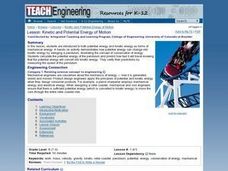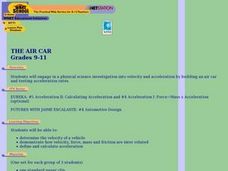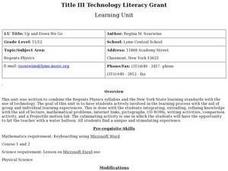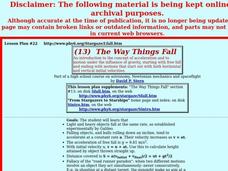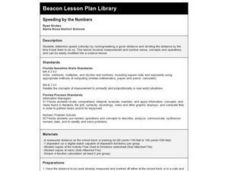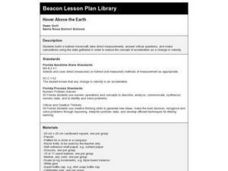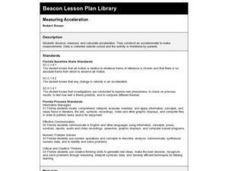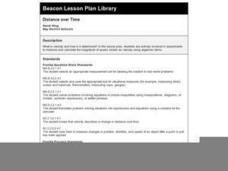Curated OER
Velocity and Acceleration
Twelfth graders look at local speed limits and traffic controls and see if they are reasonable. They plot the displacement and time to represent velocity, develop a plan for improving the current system, and organize experimental...
Curated OER
Velocity, Acceleration, and Gravity
Students perform an experiment where a string is tied across the room. A straw is threaded onto the string, and a balloon attached to the straw. Students determine the speed of the balloon as it moves across the string. They repeat the...
Curated OER
Velocity
Students explore the concepts of velocity, acceleration, distance and football. They collect data on the velocity of a football and they determine the distance and height of a football when it is thrown. Students compare their findings...
Curated OER
I Feel The Need For Speed
Students are introduced to the concepts of speed, velocity, acceleration and inertia. In groups, they use the internet to research rollercoasters found in the United States and calculate their acceleration rates. They use the...
Curated OER
The Math Reaction
Students use the reaction time to figure out problems. They use the following example to get them started with reaction time: the edge of a ruler is placed near a person's thumb and index finger and, without warning, the ruler is...
Curated OER
Bernoulli's Principle Activities
Eighth graders demonstrate Bernoulli's Principle in two simple activities after a discussion session on Bernoulli's Principle and its applications. Students divide into small groups to complete activities and wrap-up with a few review...
Curated OER
Making Impact Craters
Students examine images of Moon craters and speculate about what caused them. They create craters using sand weighted balls. Students measure crater sizes and draw ejection patterns to see what effect size, weight, and velocity have on...
Curated OER
Velocity
Students determine the average speed of a toy car as it travels six different distances set up by Students. Three trials are done for each distance. The only requirements is that the longest distance must be at least three times longer...
Curated OER
Determine Dischare of Stream
Students can explain that stream discharge defines the amount of water that passes a point in a given amount of time. They also define discharge is expressed as cubic feet/second is calculated as: average width of channel in feet x...
Curated OER
Musical Plates
Students receive current data on the movement of plates on the earth's crust. These plates shift and the magnitude of their shift over time can be tracked. They track this velocity vector on a global map and determine the speed of the...
Curated OER
Science: Vectors
Students solve vector problems and identify the x and y coordinates. They determine if the coordinates are positive, negative, or zero. Students solve problems and convert the x and y coordinates to magnitude and direction.
Curated OER
TE Lesson: Kinetic and Potential Energy of Motion
Learners investigate the difference between potential and kinetic energy. They examine the formulae associated with both types of energy. They complete how quickly a pendulum with swing by converting potential energy into kinetic energy.
Curated OER
The Air Car
Students, in groups, design and construct an air car capable of acceleration. They view a video on acceleration, test their cars and make adjustments as desired.
Curated OER
Up and Down We Go
Students explore physics concepts such as velocity, acceleration and speed to create a model of a safe roller coaster. They design and conduct a lab to demonstrate the properties of an object fired horizontally and at an angle.
Curated OER
The Way Things Fall
Students explore concept of acceleration and motion under the influence of gravity, starting with free fall and ending with motions that start out with both horizontal and vertical initial velocities.
Curated OER
When Push Comes to Crunch
Eighth graders engage in an experiment which uses an inclined plane and balls of various masses to determine the effect a large object has on a small object. They study velocity, momentum, gravity and forces.
Curated OER
Speeding By The Numbers
Students determine speed by running or walking a given distance and dividing the distance by the time it took them to do so. They record their average speed and compare it with the speeds of other moving objects.
Curated OER
Hover Above the Earth
Fourth graders build a balloon hovercraft, take direct measurements, answer critical questions, and make calculations using the data gathered in order to see the concept of acceleration as a change in velocity. They use a worksheet...
Curated OER
Measuring Acceleration
Students create an accelerometer and take measurements of acceleration in a moving car. They study the car speeding up in a straight line, slowing in a straight line and curving at constant speed. They prepare a lab report showing...
Curated OER
Distance over Time
Students analyze velocity and how it is determined. They experiment with velocity in order to measure and calculate the magnitude of speed. They use examples in their novel "Skateboard Renegade" to relate velocity to real life situations.
Curated OER
Playground Games
Students compete in playground games in order to review velocity and wave behavior in real life situations. They demonstrate understanding by calculating velocity in their "Playground Games" packet.
Curated OER
Collision Course
Students measure the speed of moving marbles and use the results to calculate velocity and momentum. They analyze the events preceding a Japanese train crash.
Curated OER
There's Gotta Be An Angle
Students examine the external variables that affect a downhill skier in the quest for speed. They access websites imbedded in this plan to become ski teams competing against one another. Each team presents results of all experiments.
Curated OER
Physics Rewind
Eighth graders differentiate speed and velocity. In this physics lesson, 8th graders explain Newton's laws of motion. They calculate speed using a mathematical formula.













